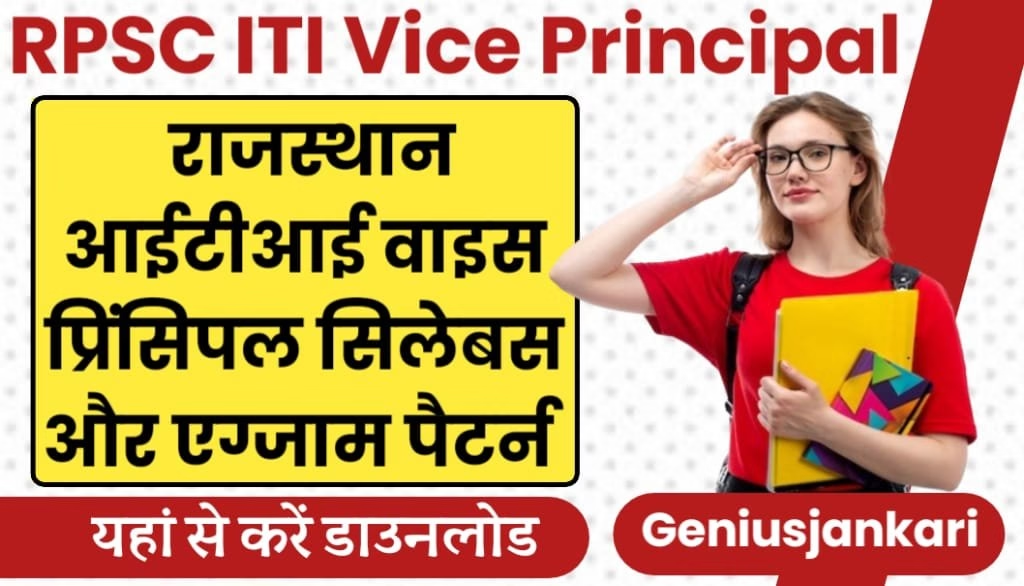RPSC ITI Vice Principal Syllabus 2024: The Rajasthan Public Service Commission (RPSC) has released the syllabus for the ITI Vice Principal exam 2024. Candidates who are interested in applying for the RPSC Vice Principal recruitment can download the official syllabus PDF from the RPSC website.
RPSC ITI Vice Principal Exam 2024 Overview
The RPSC ITI Vice Principal exam is an important examination for candidates looking to take up a Vice Principal position in the Industrial Training Institutes (ITIs) of Rajasthan. The selection process will include a written examination and an interview.
Exam Highlights:
| Exam Organization | Rajasthan Public Service Commission (RPSC) |
|---|---|
| Exam Name | Vice Principal / Superintendent ITI |
| Mode of Exam | Offline/Online |
| Exam Date | To be updated |
| No. of Questions | 150 |
| Total Marks | 150 (1 mark per question) |
| Negative Marking | 0.33 marks for each wrong answer |
| Subjects Covered | Civil, Mechanical, Electrical, IT, Computer Science, Electronics, Communication |
| Interview Marks | 15 marks |
| Syllabus PDF | Available for download on the official website |
RPSC ITI Vice Principal Exam Pattern 2024
The RPSC ITI Vice Principal exam will consist of a single paper, and the following is the exam pattern:
- Mode of Exam: The exam can be conducted either offline or online.
- Exam Duration: 2 hours 30 minutes.
- Negative Marking: 0.33 marks will be deducted for each incorrect answer or unanswered question.
- No. of Questions: 150 questions.
- Total Marks: 150 marks (1 mark for each question).
- Interview: After the written exam, a 15-mark interview will be conducted for shortlisted candidates.
Important Notes:
- Candidates must fill the fifth (E) option in case they leave a question unanswered. If more than 10% of the questions are left unanswered, the candidate will be disqualified from the exam.
Detailed RPSC ITI Vice Principal Syllabus 2024
The syllabus for the RPSC ITI Vice Principal exam 2024 covers several subjects, including Civil, Mechanical, Electrical, IT, Computer Science, and Electronics. Below is the detailed syllabus for each subject:
Civil Engineering
| Topic | Description |
|---|---|
| Engineering Materials & Construction Technology | Site selection for building, foundation requirements, fire safety, ventilation, and construction materials like stone, cement, wood, etc. |
| Surveying | Techniques like hand compass surveying, leveling, use of theodolite, triangulation, EDM, photogrammetry, and remote sensing. |
| Geotechnical Engineering | Soil classification, moisture content, permeability, consolidation, soil stability, shallow foundations, and retaining walls. |
| Structural Mechanics | Stress and strain, beam theory, bending moments, and shear force. |
| Steel Structures | Design of girders, trusses, columns, and foundations based on IS standards. |
| Reinforced Concrete Structures | Design of beams, slabs, columns, and walls using IS: 456 and IS: 875 codes. |
| Fluid Mechanics & Water Resources Engineering | Bernoulli’s theorem, laminar and turbulent flow, pipe flow, pumps, and hydrographs. |
| Environmental Engineering | Water requirements, purification, sewage systems, air pollution, and environmental management. |
| Highway & Bridges | Highway planning, design of roads, bridges, and drainage systems. |
| Construction Planning & Management | Project scheduling, cost control, PERT, and CPM methods. |
Mechanical Engineering
| Topic | Description |
|---|---|
| Thermodynamics | Laws of thermodynamics, heat engines, efficiency, and entropy. |
| Machine Design | Design of gears, shafts, bearings, and couplings. |
| Manufacturing Processes | Casting, welding, and machining processes. |
| Fluid Mechanics | Fluid statics and dynamics, pumps, turbines, and compressors. |
| Refrigeration & Air Conditioning | Refrigerants, cycle analysis, and applications in AC systems. |
Electrical Engineering
| Topic | Description |
|---|---|
| Electrical Circuits | Circuit theory, Ohm’s Law, Kirchhoff’s laws, AC/DC circuits. |
| Electrical Machines | Transformers, motors, and generators. |
| Power Systems | Power generation, distribution, and protection systems. |
| Control Systems | Feedback systems, stability, and control strategies. |
| Electronics | Semiconductors, diodes, transistors, and logic gates. |
IT & Computer Science
| Topic | Description |
|---|---|
| Data Structures & Algorithms | Linked lists, stacks, queues, sorting algorithms. |
| Programming Languages | C, C++, Java, and Python. |
| Database Management Systems | Relational databases, SQL queries, and normalization. |
| Operating Systems | OS fundamentals, memory management, and scheduling. |
| Computer Networks | TCP/IP model, network protocols, and wireless technologies. |
Preparation Tips for RPSC ITI Vice Principal Exam
- Understand the Syllabus: Carefully read and understand each topic in the syllabus. Focus on topics with higher weightage.
- Practice Previous Papers: Solving RPSC ITI Vice Principal previous year papers will help you understand the pattern and types of questions asked.
- Time Management: Allocate sufficient time for each subject. Regular revisions will help improve your speed and accuracy during the exam.
- Refer to Standard Books: Use standard textbooks and reference materials for in-depth understanding and practice.
Conclusion
The RPSC ITI Vice Principal exam is an essential step for candidates aspiring to work as Vice Principals in ITIs across Rajasthan. With the release of the syllabus, candidates can begin their preparation by focusing on the key subjects and topics listed. Regular practice, along with a clear understanding of the syllabus and exam pattern, will play a significant role in achieving success.
For more information, visit the official RPSC website and download the detailed syllabus PDF.

नमस्ते, मैं अमित वर्मा हूं। मैं सरकारी योजनाओं और स्कीम्स से संबंधित ताज़ा न्यूज़ और जानकारी हिंदी में लिखता हूं। राजस्थान से होने के कारण, मैं आपको सभी सरकारी योजनाओं के बारे में सही और आसान जानकारी देता हूं।

